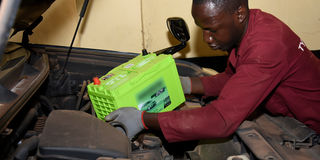Choosing the perfect car battery

A car battery is an essential accessory for the reliable operation of your vehicle.
What you need to know:
- A car battery is an essential accessory for the reliable operation of your vehicle. It is not a lifetime accessory so it is important that you assess its condition and have it changed whenever there is need.
In many instances, we are hooked to the thought that the engine is the ultimate device that is most crucial for starting a vehicle. Well, a car battery is equally important.
A car battery is a rechargeable electrochemical device that stores and provides electrical energy to power various components of a vehicle. It operates based on principles of electrochemistry, involving chemical reactions that convert chemical energy into electrical energy.
Ronald Kibuuka, a mechanic in Ttula says, “Batteries are assumed to be dead if they cannot provide power for starting a car. If you are not sure of what is causing a faulty battery, inquire from a mechanic to know what the battery’s condition is.”
How it operates
A typical car battery is made of several cells, with each containing two types of plates. The positive is made of lead dioxide and the negative plates made of sponge like lead. These plates are immersed in an electrolyte solution, which is usually a mixture of sulfuric acid and water.
During power output, when starting a car, a chemical reaction occurs within each cell. Both the negative and positive plates react with sulfuric acid to release electrons. These electrons flow through an external circuit, such as the vehicle’s wiring, creating an electrical current that powers the components.
“Likewise during recharge as the engine is running, the alternator generates electrical energy and sends it back to the battery to reverse the chemical reactions that occurred during discharge thus recharging the battery,” Kibuuka says.
Functions
A functioning and properly maintained car battery is essential for the reliable operation of a vehicle for the following reasons;
The primary purpose of a car battery is to provide the electrical power needed to start the vehicle’s engine. After turning the ignition key, the battery sends a burst of electricity to the starter motor, which in turn cranks the engine and initiates the combustion process.
“A stable supply of power from the battery,” Kibuuka says, “ensures that safety features like the airbags and anti-lock brakes are functioning properly in critical moments.”
The battery also helps stabilize the voltage in the vehicle’s electrical system. It acts as a buffer against voltage spikes that can damage sensitive electronics and components.
Modern vehicles rely heavily on electronic control units and computer systems to manage various aspects of the vehicle’s performance, safety, and efficiency. These systems require a stable and reliable source of power, which the battery provides.
How to know battery needs replacement
No car battery is meant to last forever. Car batteries typically have a lifespan of around three to five years, depending on various factors such as usage, climate, and maintenance. If your battery is nearing or past this age range, it is a good idea to proactively consider replacement, even if it is not showing obvious signs of failure yet.
However there are other circumstances that bring about shortening of the battery’s life span and as a car owner, noticing these signs can help you know that the car battery is depleted or needs replacement. These signs include;
Some modern vehicles have battery warning symbols that illuminate on the dashboard. This is a clear indicator that the battery has a problem.
Kibuuka says one will notice a faulty battery from engine cranking issues. “If your engine is slow to crank or you hear a clicking sound when trying to start the vehicle, it is a sign the battery is losing its charge and struggling to provide enough power to start the engine.”
Additionally, unusual smells near the battery can indicate the battery is venting gases and this is a potential battery problem.
He says, “Frequent jump starts are a strong indication that your battery is struggling to hold a charge and needs replacement.”
Furthermore, physical damage such as bulging, cracks or leaks reveal a battery that is compromised and needs replacement.
You can know your car battery is weak if the power accessories like power windows, locks, and seats are slower than usual.
Corrosion on the battery terminals hinders the flow of electricity between the battery and the vehicle’s electrical system thus making the battery non-functional.
Kibuuka also adds that headlights that appear noticeably dimmer than usual, and other electrical components like power windows, radio, or dashboard lights flickering indicate that the battery is not providing sufficient power to the vehicle’s electrical system.
Maintenance
Just like any other vehicle accessories, car batteries also require maintenance to ensure their proper functioning.
It is important that you do regular battery testing, turn off lights before you leave the vehicle, limit accessories when the engine is off, keep spare batteries in cool and dry places, regularly drive the vehicle, ensure proper ventilation of battery vent caps, and keep the battery clean and free from dirt, corrosion and debris.
Cost
Travis Bemba, an auto spares dealer in Bwaise, Industrial area, says battery prices differ depending on the brand (UBL, Chloride Exide), size, age (new or old), and type. There are also maintainable and maintenance free batteries.
He says, “Maintenance free (MF) batteries are more expensive compared to the maintainable batteries. This is because they do not need to be filled with acid during service yet the maintainable batteries have acids that evaporate and during service need to be topped up.”
Bemba reveals that while the price range for old maintainable batteries ranges from Shs70,000 to Shs900,000 depending on the number of hemps in the battery, the price of a new maintainance free battery costs from Shs170,000 to Shs1.4m.




